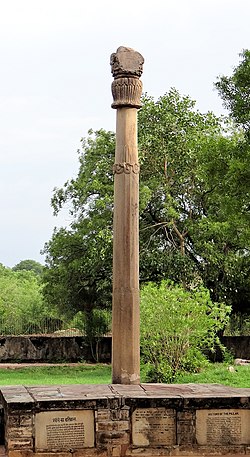| Heliodorus pillar | |
|---|---|
 | |
| Created | 113 BCE |
| Period/culture | late 2nd Century BCE |
| Place | Vidisha, Madhya Pradesh, India. |
| Present location | Vidisha, India |
The Heliodorus pillar was erected and dedicated by Heliodorus, an Indo-Greek ambassador to the Shunga Empire | |
The Heliodorus pillar is a stone column that was erected around 113 BCE in central India[1] in Besnagar (Vidisha), Madhya Pradesh. The pillar was called the Garuda-standard by Heliodorus (ambassador), referring to the deity Garuda. The pillar is commonly named after Heliodorus, who was an ambassador of the Indo-Greek king Antialcidas from Taxila, and was sent to the Indian ruler Bhagabhadra.[2] A dedication written in Brahmi script was inscribed on the pillar, venerating Vāsudeva (krishna), the Deva deva the "God of Gods" and the Supreme Deity.[3][4][5][6] The pillar also glorifies the Indian ruler as "Bhagabhadra the savior". The pillar is a stambha which symbolizes joining earth, space and heaven, and is thought to connote the "cosmic axis" and express the cosmic totality of the Deity.[3]
The Heliodorus pillar site is located near the confluence of two rivers, about 60 kilometres (37 mi) northeast from Bhopal, 11 kilometres (6.8 mi) from the Buddhist stupa of Sanchi, and 4 kilometres (2.5 mi) from the Hindu Udayagiri site.[7]
The pillar was discovered by Alexander Cunningham in 1877. Two major archaeological excavations in the 20th-century have revealed the pillar to be a part of an ancient Vāsudeva temple site.[4][8][9] Aside from religious scriptures such as the Bhagavad Gita, the epigraphical inscriptions on the Heliodorus pillar and the Hathibada Ghosundi Inscriptions contain some of the earliest known writings of Vāsudeva-Krishna devotion and early Vaishnavism and are considered the first archeological evidence of its existence.[10][11][12][13][14][6] The pillar has been called one of the earliest surviving records of a foreign convert into Vaishnavism.[15][6] An alternative interpretation is that making dedications to foreign gods was only a logical practice for the Greeks, intended to appropriate their local power and cannot be regarded as a "conversion" to Hinduism.[16]
- ^ Avari, Burjor (2016). India: The Ancient Past: A History of the Indian Subcontinent from C. 7000 BCE to CE 1200. Routledge. p. 167. ISBN 978-1-317-23673-3.
- ^ Journal of Indian History. Department of Modern Indian History. 1973.
- ^ a b Devadeva, the "God of Gods", the Supreme Deity in Approaches to Iconology. Brill Archive. 1985. p. 41. ISBN 978-90-04-07772-0.
- ^ a b Cite error: The named reference
SWwas invoked but never defined (see the help page). - ^ Cite error: The named reference
RS265was invoked but never defined (see the help page). - ^ a b c Bryant, Edwin Francis (2007). Krishna: A Sourcebook. Oxford University Press. p. 6. ISBN 978-0-19-803400-1.
- ^ Julia Shaw (2016). Buddhist Landscapes in Central India: Sanchi Hill and Archaeologies of Religious and Social Change, c. Third Century BC to Fifth Century AD. Taylor & Francis. pp. xliv, cxliv. ISBN 978-1-315-43263-2.
- ^ John Irwin 1974, pp. 166–176.
- ^ M D Khare 1975.
- ^ Krishna: The Beautiful Legend of God: Srimad Bhagavata Purana. Penguin UK. 2003-12-04. ISBN 978-0-14-191337-7.
- ^ Osmund Bopearachchi, 2016, Emergence of Viṣṇu and Śiva Images in India: Numismatic and Sculptural Evidence
- ^ Burjor Avari (2016). India: The Ancient Past: A History of the Indian Subcontinent from C. 7000 BCE to CE 1200. Routledge. pp. 165–167. ISBN 978-1-317-23673-3.
- ^ Romila Thapar (2004). Early India: From the Origins to AD 1300. University of California Press. pp. 216–217. ISBN 978-0-520-24225-8.
- ^ K. G. Goswami, A Study of Vaisnavism (Calcutta: Oriental Book Agency, 1956), p. 6
- ^ Avari, Burjor (2016). India: The Ancient Past: A History of the Indian Subcontinent from c. 7000 BCE to CE 1200. Routledge. p. 167. ISBN 978-1-317-23673-3.
- ^ "Venerating Vāsudeva, as did Heliodor in the time of Antialkidas, should not be regarded as a "conversion" to Hinduism, but rather as the result for a search for the most helpful local powers, upholding own traditions in a foreign garb." in Falk, Harry. Greek style dedications. p. 40.
